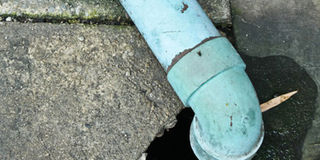Premium
Towns choking on sewer woes

PHOTO | FILE Experts warn that the problem of sewer systems due to poor urban planning is a volcano that is on the verge of eruption.
What you need to know:
- Waste disposal systems in the rapidly growing peri-urban areas are almost non-existent
Land developers in Nairobi’s satellite towns are faced with huge costs due to lack of proper urban planning. The Kajiado county governor, Dr David Nkedianye, has said that some parts of the land that had earlier been earmarked for sewer systems and other social amenities by the previous government had been illegally acquired.
Experts now warn that the problem of sewer systems due to poor urban planning is a volcano that is on the verge of eruption.
“We are faced with a big challenge as managers of properties have no option but to dispose of waste from septic tanks regularly, especially during the rainy season,” said Mututa Kisinga, the director of Sweethomes, a firm that manages the ultra-modern EPZ Plaza, Sony Plaza, and the Kitengela Capital Centre in Kitengela.
“We really bank on the county government to consider constructing sewerage systems since most of the modern premises being built have the provisions for them” James Mbugua, also of Sweethomes, said.
Septic tanks
To remove waste from a sceptic tank costs Sh11,000. In Kiserian, Kajiado County, the Sh1 billion government-funded dam is incomplete.
“The use of the water from the Kiserian Dam has stalled due to the high pollution from the septic tanks in the area,” said Kajiado County engineer Malika Badiribu.
“The issue of the sewer system and solid waste management will be carried out in phases but with different ministries among the local governments. It is a huge task, but it has to be undertaken,” said Dr Nkedianye.
Gitau Persimei, a consultant with Link Africa, says lack of urban planning is a major problem in big towns, including Nairobi city.
“Any urban expert will tell you that poor city planning will fail to favour the economy,” he says.
Septic tanks serve as a temporary solution to some home owners. But it is now emerging that some building contractors are doing sub-standard work.
“I bought a family house five years ago. After six months, the foul smell of raw waste was returning to the house. We tried to treat the toilets but without much success. We later learnt that the septic tank was shallow and was already full,” said Joseph Munari, a house owner in Kitengela. He had to spend Sh185,000 to construct a septic tank.
Dr Nkedianye has promised to find a solution to the sewer problem in Kajiado County. It is estimated that Sh15 billion is needed to construct a modern sewer system in all the county’s towns.
To bring sanity to the housing industry and ensure quality, the newly-formed National Construction Authority (NCA) has started fresh registration of contractors in a bid to weed out the “cowboys” in the sector. Mr Daniel Manduku, the executive director of NCA, recently told a contractors’ conference at Multi-Media University in Nairobi that the registration was a prerequisite for the development of the construction industry in Kenya.
“The industry has suffered due to poor legislative framework, unqualified persons, as well as competition from foreign contractors believed to offer cheaper and better quality work,” said the director.
The Athi River Export Processing Zone last year announced plans to expand its sewer system.
“Our system is basically aimed at helping the EPZ factories to dispose of the waste and factory effluent. We have no intention of providing sewer management solutions to any of the neighbouring towns,” said the zone’s public relations officer, Mr Jonathan Chifallu.
The factories recycle waste and purify water which can then be used for irrigation or cleaning. “The big challenge in many upcoming towns is lack of technology to recycle waste into safe reusable or disposable products,” says engineer Alvine Ndung’u of the Excloosive Company.
“Ours is to ensure that instead of spending huge sums of money on waste disposal, we reduce the effect of the problem,” he said.




